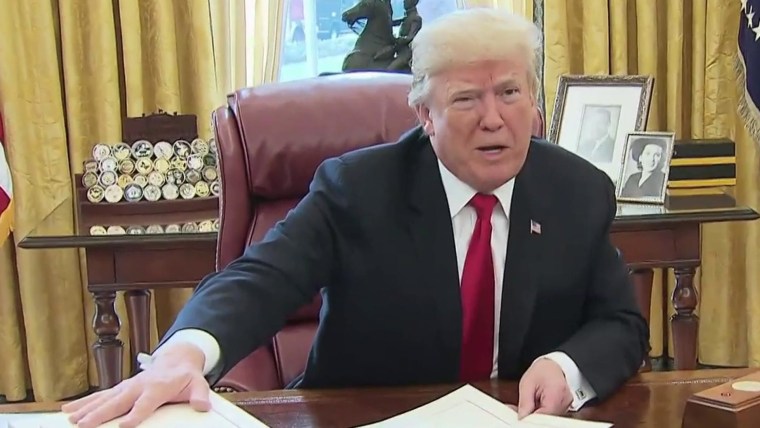Last week in Iran, officials tried and failed to launch a purported satellite, prompting Donald Trump to publish a tweet insisting the United States was involved in the incident. The point of the presidential tweet wasn't altogether clear, though by most measures, Trump seemed to be taunting Tehran.
But the president's tweet didn't just feature text; it also included a detailed photo. As MSNBC's Andrea Mitchell reported, it wasn't long before observers started wondering whether Trump had publicly released classified material.
Two outside experts said the image that accompanied the tweet would be available only to a government source and was very likely classified.They noted the resolution on the image is higher than images available to anyone but the government. It could have come from a presidential intelligence briefing, they said. [...]With his detailed public message, the president could be letting Tehran know that the U.S. is watching, analysts suggested. In the process, however, Trump might have disclosed critical aspects of U.S. intelligence capabilities, something usually done only for important tactical reasons, including public presentation of evidence to the United Nations Security Council to buttress U.S. claims about a military incident.
For his part, Trump told reporters late Friday afternoon, "We had a photo. I released it, which I have the absolute right to do."
That may be true. While I won't pretend to be an expert, presidents have declassification authority. In this case, it's entirely possible that Trump was presented with a sensitive photograph; he declassified it; and he published it to Twitter.
Indeed, CNBC spoke to a U.S. defense official who said "the picture in Trump's tweet, which appeared to be a snapshot of a physical copy of the satellite image, was included in a Friday intelligence briefing."
But even if the president's tweet was technically allowed, what's permissible isn't always what's wise. Why signal our intelligence gathering capabilities? How does that benefit the United States? Didn't Trump spend a year and a half on the campaign trail complaining about Hillary Clinton being careless with sensitive intelligence?
I'm reminded anew of a recent column from the Washington Post’s David Ignatius, who explained that the American president and his allies have been “straining the covert alliance to the point that some insiders on both sides worry that trust and cooperation could eventually begin to erode.”
Former British officials believe that MI6 has begun to worry about sharing its most sensitive secrets with the United States, for fear that they may be disclosed by the Trump White House for political reasons, or through simple carelessness. This British concern about the U.S. ability to keep secrets predates Trump, but it has increased.“You never know what Trump will say or do or tell in a rage, and that’s something to worry about,” says a former British official. “The U.S. has become a less reliable ally.”
House Intelligence Committee Chairman Adam Schiff (D-Calif.) suggested to Ignatius that the relationship will likely improve once Trump leaves office. He added, however, “There’s nothing I can say that will disabuse [U.S. allies] of concern about what this president might do with information that could be damaging to them.”
As we discussed at the time, I continue to think this is one of the more under-appreciated problems with the Trump presidency. It was, after all, just four months into Trump's presidency that he welcomed Russian Foreign Minister Sergei Lavrov and Russian Ambassador to the U.S. Sergei Kislyak into the Oval Office – at the request of Russian President Vladimir Putin – for a visit that was never fully explained.
It was in this meeting that Trump revealed highly classified information to his Russian guests for no apparent reason. The Washington Post reported at the time, “The information the president relayed had been provided by a U.S. partner through an intelligence-sharing arrangement considered so sensitive that details have been withheld from allies and tightly restricted even within the U.S. government, officials said.”
The Wall Street Journal added, “According to one U.S. official, the information shared was highly sensitive and difficult to acquire and was considered extraordinarily valuable.”
In a normal White House, this story would’ve been an enormous scandal that haunted the president for the rest of his term, but in the Trump era, it was soon eclipsed by a dozen other evolving controversies. Regardless, the leak happened, and the public has never received an explanation for why the president did what he did.
Less than a year later, Trump ignored the pleas of many U.S. officials and recklessly declassified information in the hopes of advancing a partisan scheme. All the while, the president refused to give up his unsecured smart phones, which create additional security risks.
About a month after Trump’s inauguration, the Wall Street Journal reported that U.S. intelligence officials were worried about the new president’s “trustworthiness” and “discretion.”
In light of Trump's Iran tweet on Friday, it seems those officials were right to be concerned.
